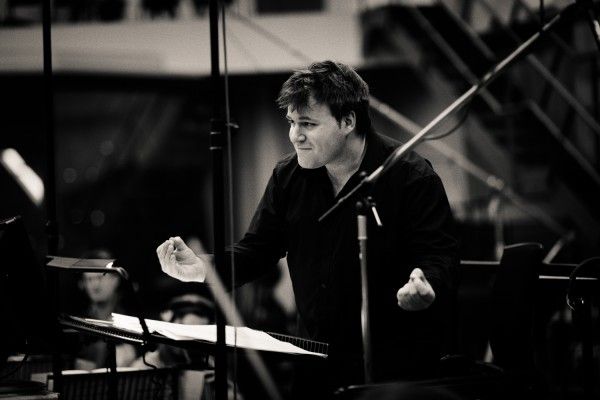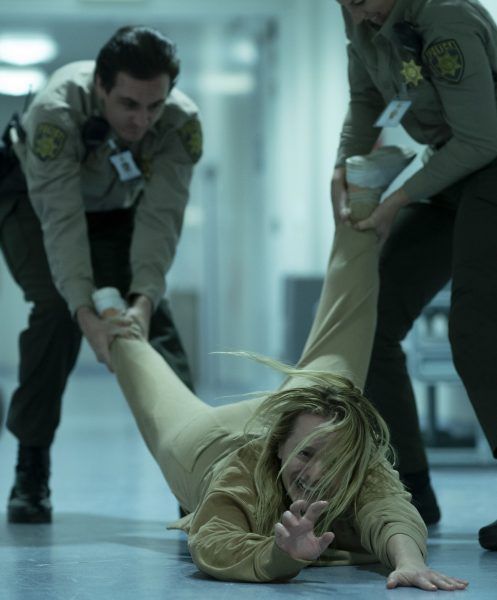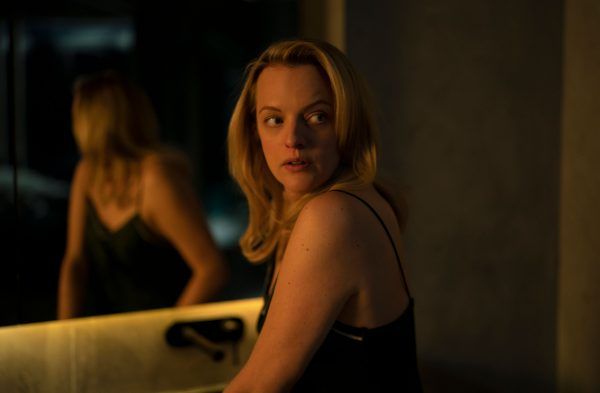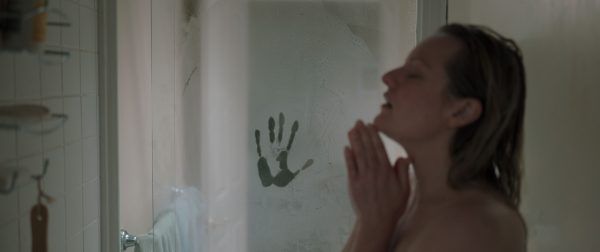It’s not often a film composer is asked to use silence as part of his sonic soundscape for a particular project, but that’s exactly how Benjamin Wallfisch approached his excellent score for Universal’s horror-thriller The Invisible Man. The film is ostensibly based on the classic monster movie of the same name, but co-writer/director Leigh Whannell has in truth crafted a wholly unique take on a story in which a man turns himself invisible. This is a monster movie that makes the victim the protagonist, as Whannell’s film finds a domestic abuse survivor named Cecilia (played brilliantly by Elisabeth Moss) tormented by her violent husband following his supposed death. No one believes her, of course, because there’s no one there, but Cecilia’s arc hews horrifically close to the experience so many women go through each and every day. The disbelief. The dismissals. The gaslighting.
The Invisible Man expertly weaves tension and true horror throughout, resulting in a genuinely terrifying moviegoing experience. That’s due in no small part to Wallfisch’s alternatively elegant and aggressive score, which will surely end up being one of the best film scores of the year.
I recently got the opportunity to speak to Wallfisch about his work on the film, and he explained how he and Whannell used silence and the absence of sound to affect tension and terror throughout the film. The delicate balance between a loud soundscape and total silence (save for the echo of the music you just heard) result in a playful yet effective companion to the terror of The Invisible Man himself. One minute he’s there, the next he’s gone… or is he?
Wallfisch also discussed how Bernard Herrmann influenced his work on the film, why he and Whannell wanted the music to take an active role in the experience of watching the film, and how he approaches each “horror” movie he does differently having also worked on both It movies, Lights Out, and Annabelle: Creation. The composer also briefly teased his work on the upcoming Mortal Kombat movie and revealed that yes, he’s been talking to Shazam! director David F. Sandberg about potentially returning for the sequel.
It’s an insightful conversation about the making of one of 2020’s best film scores so far. Check it out below.
How did you first get involved with The Invisible Man?
BENJAMIN WALLFISCH: I got a phone call, and was really intrigued to see what this reimagination of such a classic movie could look like. As soon as I saw the film, particularly Elisabeth Moss's performance, which is so extraordinary and so powerful, I knew it was a project I wanted to be involved in. I had a great meeting with the director Leigh Whannell, and it went from there.
What were some of those early conversations with Leigh like about how he saw the music for the film?
WALLFISCH: Well, the film is incredibly visceral and quite stylized in the sense that it feels almost like a classic Hitchcockian thriller, but with a very modern take. And the film isn't afraid to upend a lot of the expectations one might have from a horror/thriller genre. It's a very unique and extraordinarily well-crafted film, and very precise in its choices, editorially, and how the audience is really kept absolutely on the edge of their seat throughout. Leigh's vision was to have the music very much as a character, and not just as underscore. We really wanted the score to take an active role in the experience of the film. A lot of it was about articulating and using silence in a very rhythmic way. By that I mean: when there is music, it tends to be very left field, bold and quite extreme. So you almost don't trust the absence of music when there's silence. By doing that the silence almost becomes a musical event. There are very careful structural choices that were made to maximize that.
This is such a different twist on the classic universal monster, and I think it's a really smart kind of modern take on that, but did you and Leigh discuss the music of those earlier existing films at all?
WALLFISCH: We didn't really revisit those classic movies. Maybe because this is such a new and very fresh take on the concepts, and the film needed a unique sound. Having said that, though, one of my great heroes is Bernard Herrmann, and I've always marveled at what he managed to achieve with just a string orchestra in PSYCHO. It's one of my favorite scores for that reason. For a long time I wanted to write a score where, in terms of the orchestration, it's only strings, because the string players are really pushed to their absolute max when they don't have the support of a full orchestra. It's a much more intense sound in many ways, when you're asking just strings to play as if they're a full orchestra. That was the orchestral choice for this score.
And the way that Elisabeth Moss’s performance is, it’s so emotional and so real, and also, this gaslighting component of her experience, where everyone around her thinks she’s going crazy whilst she’s actually in imminent danger for the whole movie. The way that she still manages to hold onto a shred of sanity in those circumstances, and eventually triumphs in a really cathartic way, meant that she needed a theme which served almost as a reminder of her own sanity. First there is a cello theme which you hear when she finds out Adrian is dead, and at a couple of other key moments, and secondly a piano theme which has an insistent, building quality. This is also heard only a handful of times in the score, but is meant to convey her inner strength.
And then, in contrast, Adrian Griffin, The Invisible Man, his world is entirely electronic and very aggressive. The sound which Leigh and I were trying to go for him was an electronic sound where things are pushed to the limit in terms of aggression at times, but also something very quiet and indistinct, so it almost creeps up on you. Adrian has a kind of synth leit motif, something we called a ‘growl’. It shifts in tone throughout and gives him presence even when you can’t see him. It was really fun to have the string orchestra and the electronic elements to the score co-exist in that way.
In terms of Adrian, what is it like for you to score a character who visibly isn't there?
WALLFISCH: Sometimes it's more terrifying when there is just silence, and again, when you feel the echoes of a cue that has just happened. And also not using music in that traditional horror film way where it’s like, ‘Okay, everything's gone quiet. You're about to have a jump scare.’ We never do that. Of course like I just mentioned, there is a motif for the Invisible Man, but it's not like whenever we want the audience to think he's there, you hear it. Sometimes it's about sort of setting up the expectation and then not doing it and the tension that that creates is sometimes more interesting.
You have a lot of experience in the horror genre and I'm kind of curious, first of all, what unique challenges Invisible Man brought to that genre. And then secondly, for each film, is there a horror “gear” that you shift in when you're doing horror films or are they all entirely different?
WALLFISCH: To be honest, for all the horror movies I’ve done, I rarely think of them as horror films. It Chapter One and It Chapter Two for me are adventure movies and a very powerful, emotional coming of age story. The horror elements are obviously very, very striking and terrifying, but those films get their incredible strength and beauty and they are what they are because of the connection between the members of the Losers Club. Obviously movies like Annabelle and Lights Hout that’s all about very precise tension and release.
But again, if you’re not invested in the characters, it’s hard to feel genuinely scared for them, because you need to be right there with them. The Invisible Man is very much in my mind a psychological thriller, and it was about really getting inside the point of view of Elisabeth Moss’s character, Cecilia and seeing everything through her eyes. The movie has so many layers and I would say for me, it’s certainly one of the most sophisticated horror/thrillers I’ve ever seen. It’s, just masterfully executed by Leigh and his editorial team. There’s such precision to it and I can’t really think of a similar movie. Maybe The Ring is another good example of a movie that is on the surface a horror, but gets its momentum from being a powerful thriller.
That's obviously very different kinds of sounds.
WALLFISCH: For me it’s just every treating every movie as a blank canvas and making sure that story and character are put first. And in this case, Cecilia’s character drove almost all of the decisions I made musically and Elisabeth Moss’s performance in particular, was the inspiration for so much of the emotional beats in the score. But we also had to be very experimental, and a lot of the musical choices were things I’ve never done before, which for me is the most exciting place to be.
That's awesome. I definitely don't want to take up too much for your time, but I am very intrigued by Mortal Kombat. What can you tease about that project?
WALLFISCH: I mean, sadly, I can't tell you anything (laughs). Other than I'm incredibly excited to be on board something so iconic as this. It's a huge honor, and I feel that the weight of expectation on my shoulders from the community of fans for this iconic franchise. I'm just incredibly honored and excited to go on that journey.
Have you talked to David [Sandberg] about returning to the Shazam! sequel at all?
WALLFISCH: Yes, we've definitely had discussions about that and I'm really excited about that sequel.
The Invisible Man is now playing in theaters.





